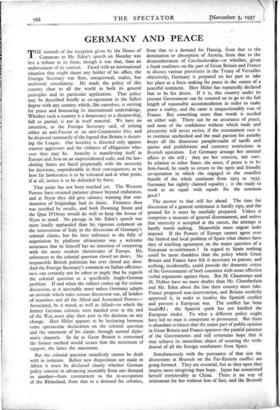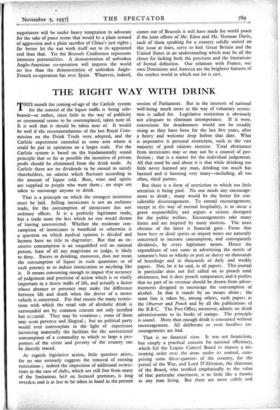GERMANY AND PEACE
THE warmth of the reception given by the House of Commons to Mr. Eden's speech on Monday was less a tribute to its form, though it was that, than an endorsement of its content. Faced with an international situation that might daunt any holder of his office, the Foreign Secretary was firm, unequivocal, realist, but uniformly conciliatory. He made the policy of this country clear to all the world in both its general principles and its particular application. That policy may be described briefly as co-operation in the fullest degree with any country which, like ourselves, is striving for peace and honouring its international undertakings. Whether such a country is a democracy or a dictatorship, full or partial, is not in itself material. We have no intention, as the Foreign Secretary said, of joining either an anti-Fascist or an anti-Communist bloc, and he disposed summarily of the legend that Britain is desert- ing the League. Our hostility is directed only against wanton aggressors and the violators of obligations who- ever they may be. Anarchy is manifesting itself in Europe and Asia on an unprecedented scale, and the law- abiding States are faced perpetually with the necessity for decisions, unpredictable in their consequences, as to how far lawlessness is to be tolerated and at what point, if at all, justice is to be defended by force.
That point has not been reached yet. The Western Powers have strained patience almost beyond endurance, and at Nyon they did give salutary warning that con- donation of brigandage had its limits. Firmness then was justified by results, and both Downing Street and the Quai D'Otsay would do well to keep the lesson of Nyon in mind. No passage in 'Mr. Eden's speech was more loudly applauded than his vigorous comment on the intervention of Italy in the discussion of Germany's colonial claims, but his later reference to the folly of negotiation by platform ultimatums was a welcome assurance that he himself has no intention of competing with the more strident rhetoricians of Europe. His references to the colonial question closed no doors. No responsible British politician has ever closed any door. And the Foreign Secretary's comment on Italian officious- ness can certainly not be taken to imply that he regards the colonial question as a specifically Anglo-German problem. If and when the subject comes up for serious discussion, as it inevitably must unless Germany adopts an attitude which rules serious discussion out, all holders of mandates and all the Allied and Associated Powers— Associated, be it noted, as well as Allied—to which the former German colonies were handed over at the end of the War, must play their part in the decision on any change. Herr Hitler appears to be hesitating between some spectacular declaration on the colonial question and the statement of his claims through normal diplo- matic channels. So far as Great Britain is concerned the former method would secure him the minimum of support, the latter the maximum.
But the colonial question manifestly cannot be dealt with in isolation. Before new dispositions are made in Africa it must be disclosed clearly whether German policy consists in advancing insatiably from one demand to another—from rearmament to the re-occupation of the Rhineland, from that to a demand for colonies, from that to a demand for Danzig, from that to the domination or absorption of Austria, from that to the dismemberment of Czechoslovakia—or whether, given a frank readiness on the part of Great Britain and France to discuss various provisions_ in the Treaty of Versailles objectively, Germany is prepared on her part to take her place as a force making for peace in the centre of a peaceful continent. Herr Hitler has repeatedly declared that to be his desire. If it is, this country under its present Government can be counted on to go to the full length of reasonable accommodation in order to make peace a reality, and the same is unquestionably true of France. But something more than words is needed on either side. There can be no assurance of peace, and none of the confidence without which trade and prosperity will never revive, if the rearmament race is to continue unchecked and the mad passion for autarky keeps all the disastrous paraphernalia of tariffs and quotas and prohibitions and currency restrictions in feverish operation. Let Germany arrange her internal affairs as she will ; they are her concern, not ours. In relation to other States she must, if peace is to be firm-based, be ready to return to the open and friendly co-operation in which she engaged to the manifest benefit of the whole continent from 1925 to 1933. Germany has rightly claimed equality ; is she ready to work as an equal with equals for the common good ?
The answer to that still lies ahead. The time for discussion of a general settlement is hardly ripe, and the ground for it must be carefully prepared. Unless it comprises a measure of general disarmament, and unless that necessity is accepted at the outset, the attempt is hardly worth making. Meanwhile more urgent tasks impend. If the Powers of Europe cannot agree over the limited and local problem of Spain what chance have they of reaching agreement on the major question of a European re-settlement ? In regard to Spain nothing could be more thankless than the policy which Great Britain and France have felt it necessary to pursue, and nothing, incidentally, could provide the domestic critics of the Governments of both countries with more effective, verbal arguments against them. But M. Chautemps and M. Delbos have no more doubts than Mr. Chamberlain and Mr. Eden about the line their country must take. France proposed non-intervention, and Britain cordially approved it, in order to localise the Spanish conflict and prevent a European war. The conflict has been localild ; the Spanish spark has not kindled the European tinder. To what a different policy might have led no man is competent to pronounce. But there is abundant evidence that the major part of public opinion in Great Britain and France approves the painful patience of the Governments and still entertains hope that it may achieve its immediate object of securing the with- drawal of all the foreign combatants from Spain.
Simultaneously with the pursuance of that aim the discussions at Brussels on the Far-Eastern conflict are going forward. They are essential, but as they open they inspire more misgiving than hope. Japan has committed herself irretrievably in China. There is no way of retirement for her without loss; of face, and the Brussels negotiators will be under heavy temptation to advocate for the sake of peace terms that would be a plain reward of aggression and a plain sacrifice of China's just rights ; far better let the war work itself out to its appointed end than that. Yet the Brussels Conference represents immense potentialities. A demonstration of unbroken Anglo-American co-operation will impress the world no less than the demonstration of unbroken Anglo- French co-operation has over Spain. Whatever, indeed, comes out of Brussels it will have made for world peace if the joint efforts of Mr. Eden and Mr. Norman Davis, each of them speaking for a country solidly united on this issue at least, serve to knit Great Britain and the United States in an understanding which may be all the closer for lacking both the precision and the limitations of formal definition. Our relations with France, our own Dominions and America are the brightest features of the sombre world in which our lot is cast.















































 Previous page
Previous page